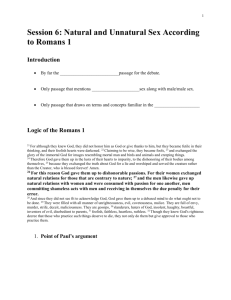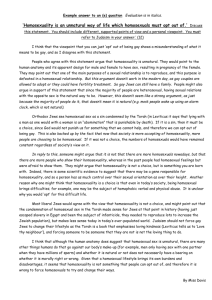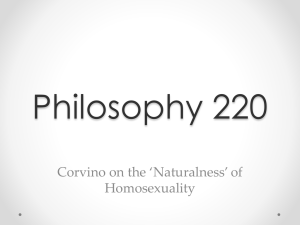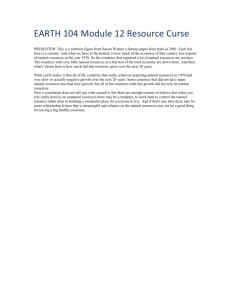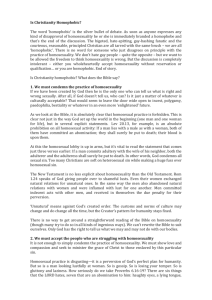As Natural as the Birds and the Bees
advertisement
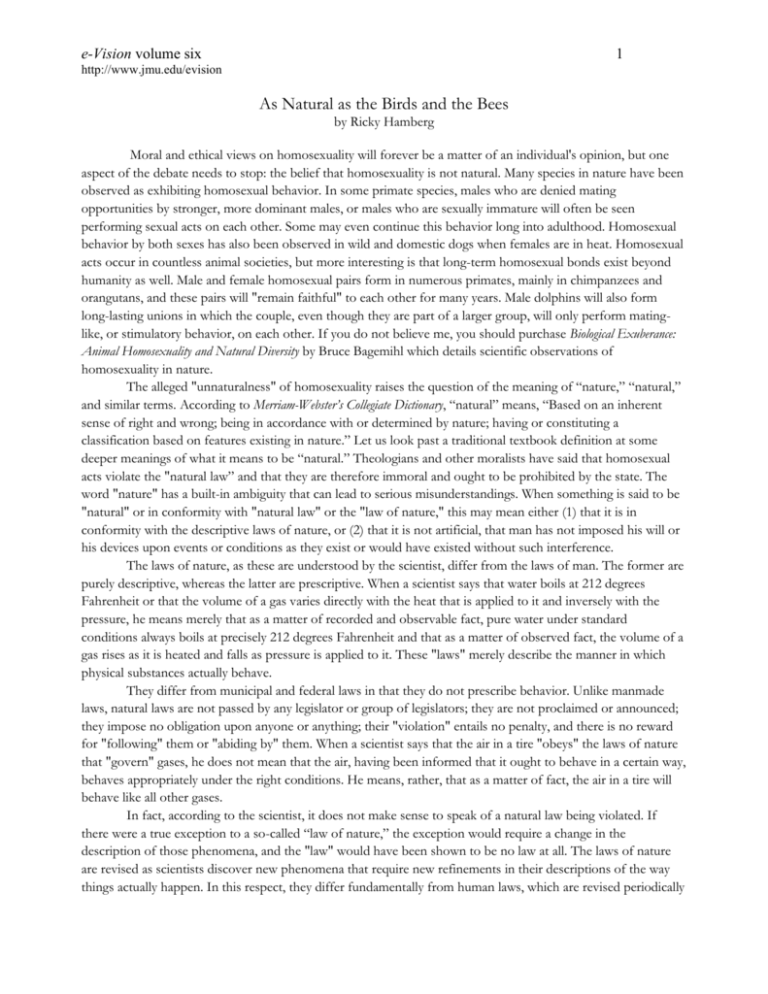
e-Vision volume six 1 http://www.jmu.edu/evision As Natural as the Birds and the Bees by Ricky Hamberg Moral and ethical views on homosexuality will forever be a matter of an individual's opinion, but one aspect of the debate needs to stop: the belief that homosexuality is not natural. Many species in nature have been observed as exhibiting homosexual behavior. In some primate species, males who are denied mating opportunities by stronger, more dominant males, or males who are sexually immature will often be seen performing sexual acts on each other. Some may even continue this behavior long into adulthood. Homosexual behavior by both sexes has also been observed in wild and domestic dogs when females are in heat. Homosexual acts occur in countless animal societies, but more interesting is that long-term homosexual bonds exist beyond humanity as well. Male and female homosexual pairs form in numerous primates, mainly in chimpanzees and orangutans, and these pairs will "remain faithful" to each other for many years. Male dolphins will also form long-lasting unions in which the couple, even though they are part of a larger group, will only perform matinglike, or stimulatory behavior, on each other. If you do not believe me, you should purchase Biological Exuberance: Animal Homosexuality and Natural Diversity by Bruce Bagemihl which details scientific observations of homosexuality in nature. The alleged "unnaturalness" of homosexuality raises the question of the meaning of “nature,” “natural,” and similar terms. According to Merriam-Webster’s Collegiate Dictionary, “natural” means, “Based on an inherent sense of right and wrong; being in accordance with or determined by nature; having or constituting a classification based on features existing in nature.” Let us look past a traditional textbook definition at some deeper meanings of what it means to be “natural.” Theologians and other moralists have said that homosexual acts violate the "natural law” and that they are therefore immoral and ought to be prohibited by the state. The word "nature" has a built-in ambiguity that can lead to serious misunderstandings. When something is said to be "natural" or in conformity with "natural law" or the "law of nature," this may mean either (1) that it is in conformity with the descriptive laws of nature, or (2) that it is not artificial, that man has not imposed his will or his devices upon events or conditions as they exist or would have existed without such interference. The laws of nature, as these are understood by the scientist, differ from the laws of man. The former are purely descriptive, whereas the latter are prescriptive. When a scientist says that water boils at 212 degrees Fahrenheit or that the volume of a gas varies directly with the heat that is applied to it and inversely with the pressure, he means merely that as a matter of recorded and observable fact, pure water under standard conditions always boils at precisely 212 degrees Fahrenheit and that as a matter of observed fact, the volume of a gas rises as it is heated and falls as pressure is applied to it. These "laws" merely describe the manner in which physical substances actually behave. They differ from municipal and federal laws in that they do not prescribe behavior. Unlike manmade laws, natural laws are not passed by any legislator or group of legislators; they are not proclaimed or announced; they impose no obligation upon anyone or anything; their "violation" entails no penalty, and there is no reward for "following" them or "abiding by" them. When a scientist says that the air in a tire "obeys" the laws of nature that "govern" gases, he does not mean that the air, having been informed that it ought to behave in a certain way, behaves appropriately under the right conditions. He means, rather, that as a matter of fact, the air in a tire will behave like all other gases. In fact, according to the scientist, it does not make sense to speak of a natural law being violated. If there were a true exception to a so-called “law of nature,” the exception would require a change in the description of those phenomena, and the "law" would have been shown to be no law at all. The laws of nature are revised as scientists discover new phenomena that require new refinements in their descriptions of the way things actually happen. In this respect, they differ fundamentally from human laws, which are revised periodically e-Vision volume six 2 http://www.jmu.edu/evision by legislators who are not as interested in describing human behavior as they are in prescribing what human behavior should be. On occasion when we say that something is not natural, we mean that it is a product of human artifice. My computer is not a natural object, in this sense, for the substances of which it is composed have been removed from their natural state, the state in which they existed before men came along, and have been transformed by a series of chemical and physical and mechanical processes into other substances. They have been rearranged into a whole that is quite different from anything found in nature. In short, my computer is an artificial object. Now when theologians and moralists speak of homosexuality and other forms of human behavior as being unnatural, and say that for that reason such behavior must be considered to be wrong, in what sense are they using the word unnatural? Are they saying that homosexual behavior is contrary to the scientific laws of nature, are they saying that they are artificial forms of behavior, or are they using the terms natural and unnatural in some third sense? They cannot mean that homosexual behavior violates the laws of nature in the first sense, for, as we have pointed out, in that sense it is impossible to violate the laws of nature. Those laws, being merely descriptive of what actually does happen, would have to include homosexual behavior if such behavior does actually take place. Even if the defenders of the theological view that homosexuality is unnatural were to appeal to a statistical analysis by pointing out that such behavior is not normal from a statistical point of view, and therefore not what the laws of nature require, it would be open to their critics to reply that any descriptive law of nature must account for and incorporate all statistical deviations, and that the laws of nature, in this sense, do not require anything. If those who say that homosexual behavior is unnatural are using the term unnatural in the second sense, it is difficult to see why they should be worrying about it. Certainly nothing is intrinsically wrong with going against nature in this sense. That which is artificial is often far better than what is natural. Artificial homes seem, at any rate, to be more suited to human habitation and more conducive to longer life and better health than caves and other natural shelters. There are distinct advantages to the use of such unnatural (i.e., artificial) amenities as clothes, furniture, and books. Homosexual behavior can hardly be considered to be unnatural in this sense. There is nothing "artificial" about such behavior. On the contrary, it is quite natural, in this sense, to those who engage in it. And even if it were not, even if it were quite artificial, this is not in itself a ground for condemning it. It would seem, then, that those who condemn homosexuality as an unnatural form of behavior must mean something else by the word unnatural, something not covered by either of the preceding definitions. A third possibility is this: if the fact that it is uncommon is what is meant by those who condemn homosexuality on the ground that it is unnatural, it is quite obvious that their condemnation cannot be accepted without further argument, for the fact that a given form of behavior is uncommon provides no justification for condemning it. Playing the viola in a string quartet is no doubt an uncommon form of human behavior. I do not know what percentage of the human race engages in such behavior, or what percentage of his life any given violist devotes to such behavior, but I suspect that the number of such people must be very small indeed, and that the total number of man-hours spent in such activity would justify our calling that form of activity uncommon, abnormal, and therefore unnatural, in this sense of the word. Yet there is no reason to suppose that such uncommon, abnormal behavior is, by virtue of its uncommonness, deserving of condemnation or ethically or morally wrong. On the contrary, many forms of behavior are praised precisely because they are so uncommon. Great artists, poets, musicians, and scientists are "abnormal" in this sense; but clearly the world is better off for having them, and it would be absurd to condemn them or their activities for their failure to be common and normal. If homosexual behavior is wrong, then, it must be for some reason other than its "unnaturalness" in this sense of the word. e-Vision volume six 3 http://www.jmu.edu/evision Every organ and every instrument, perhaps even every creature, has a function to perform, so some people argue, one for which it is particularly designed. Any use of those instruments and organs that is consonant with their purposes is natural and proper, but any use that is inconsistent with their principal functions is unnatural and improper, and is, to that extent, evil or harmful. Human teeth are admirably designed for their principal functions, biting and chewing the kinds of food suitable for human consumption. But they are not particularly well suited for prying the caps from beer bottles. If they are used for the latter purpose, which is not natural to them, they are liable to crack or break under the strain. The abuse of one's teeth leads to their destruction and to a consequent deterioration in one's overall health. If they are used only for their proper function, however, they may continue to serve one well for many years. What we must do, then, is to find the proper use, or the true purpose, of each organ in our bodies. Once we have discovered that, we will know what constitutes the natural use of each organ, and what constitutes an unnatural, abusive, and potentially harmful employment of the various parts of our bodies. If we are rational, we will be careful to confine our behavior to our proper functions and to refrain from unnatural behavior. According to those philosophers who follow this line of reasoning, the way to discover the "proper" use of any organ is to determine what it is peculiarly well suited to do. The eye is suited to seeing, the ear to hearing, the nerves to transmitting impulses from one part of the body to another, and so on. What are sex organs peculiarly suited to do? Obviously, they are peculiarly suited to enable men and women to reproduce their own kind. No other organ in the body is capable of fulfilling that function. It follows, according to those who follow the natural-law line, that the "proper" or "natural" function of the sex organs is reproduction, and that, strictly speaking, any use of those organs for other purposes is unnatural, abusive, potentially harmful, and therefore wrong. The sex organs have been given us to use in order for us to maintain the continued existence of mankind on this earth. All perversions, including masturbation, homosexual behavior, and heterosexual intercourse that deliberately frustrate the design of the sexual organs are unnatural and bad. As Pope Pius XI once said, "Private individuals have no other power over the members of their bodies than that which pertains to their natural ends." But the problem is not so easily resolved. Is it true that every organ has one and only one proper function? A hammer may have been designed to pound nails, and it may perform that particular job best. But it is not sinful to employ a hammer to crack nuts if I have no other more suitable tool immediately available. The hammer, being a relatively versatile tool, may be employed in a number of ways. It has no one "proper" or "natural" function. A woman's eyes are well adapted to seeing, it is true. But they seem also to be well adapted to flirting. Is a woman's use of her eyes for the latter purpose sinful merely because she is not using them, at that moment, for their "primary" purpose of seeing? Our sexual organs are uniquely adapted for procreation, but that is obviously not the only function for which they are adapted. Human beings may and do use those organs for a great many other purposes, and it is difficult to see why any one use should be considered to be the only proper one. The sex organs, for one thing, seem to be particularly well adapted to give their owners and others intense sensations of pleasure. Unless one believes that pleasure itself is bad, there seems to be little reason to believe that the use of the sex organs for the production of pleasure in oneself or in others is evil. In view of the peculiar design of these organs, with their great concentration of nerve endings, it would seem that they were designed with that very goal in mind, and that their use for such purposes would be no more unnatural than their use for the purpose of procreation. Nor should we overlook the fact that human sex organs may be and are used to express, in the deepest and most intimate way open to man, the love of one person for another. Even the most ardent opponents of "unfruitful" intercourse admit that sex does serve this function. They have accordingly conceded that a man and his wife may have intercourse even though she is pregnant or past the age of child bearing, or in the infertile period of her menstrual cycle. e-Vision volume six 4 http://www.jmu.edu/evision Human beings are remarkably complex and adaptable creatures. Neither they nor their organs can properly be compared to hammers or to other tools. The analogy quickly breaks down. The generalization that a given organ or instrument has one and only one proper function does not hold up, even with regard to the simplest manufactured tools, for, as we have seen, a tool may be used for more than one purpose, less effectively than one especially designed for a given task, perhaps, but "properly" and certainly not sinfully. To sum up, then, the proposition that any use of an organ that is contrary to its principal purpose or function is unnatural assumes that organs have a principal purpose or function, but this may be denied on the ground that the purpose or function of a given organ may vary according to the needs or desires of its owner. It may be denied on the ground that a given organ may have more than one principal purpose or function, and any attempt to call just one use the only natural one seems to be arbitrary. Also, the proposition suggests that what is unnatural is evil or depraved. This goes beyond the pure description of things, and enters into the problem of the evaluation of human behavior, which leads us to the fifth meaning of "natural." When one condemns homosexuality on the ground that it is unnatural, one implies that whatever is unnatural is bad, wrongful, or perverse. But as we have seen, in some sense of the word, the unnatural (i.e., the artificial) is often very good, whereas that which is natural may be very bad indeed. Clearly, someone who opposes homosexuality cannot have intended merely to reduce the word natural to a synonym of good, right, and proper, and unnatural to a synonym of evil, wrong, improper, corrupt, and depraved. If that were all they had intended to do, there would be very little to say about whether a given form of behavior might be proper, even though it is not in strict conformity with someone's views of what is natural; for good and natural, being synonyms, it would follow inevitably that whatever is good must be natural and vice versa, by definition. This is certainly not what the opponents of homosexuality have been saying when they claim that homosexuality, being unnatural, is evil. For if it were, their claim would be quite empty. They would be saying merely that homosexuality is evil. This assertion, however, is not an argument. Those who hold that homosexuality and other sexual "perversions" are "evil" on the ground that they are "unnatural" are saying that there is some objectively identifiable quality in such behavior that is unnatural; and that that quality, once it has been identified by some kind of scientific observation, can be seen to be detrimental to those who engage in such behavior, or to those around them; and that because of the harm (physical, mental, moral, or spiritual) that results from engaging in any behavior possessing the attribute of unnaturalness, such behavior must be considered to be wrongful, and should be discouraged by society. "Unnaturalness" and "wrongness" are not synonyms, then, but different concepts. The problem with which we are wrestling is that we are unable to find a meaning for unnatural that enables us to arrive at the conclusion that homosexuality is unnatural, or that if homosexuality is unnatural, it is therefore wrongful behavior. We have examined several common meanings of natural and unnatural and have seen that none of them performs the task that it must perform if the advocates of this argument are to prevail. Without some more satisfactory explanation of the connection between the wrongfulness of homosexuality and its alleged unnaturalness, the argument must be rejected. Face it: homosexuality is a natural behavior, as natural as the birds and bees. Being gay is not exclusive to homo sapiens, to the primate who is man. No biologist has ever documented anti-homosexual behavior in nature. A group of dolphins has never been found beating another dolphin senseless because he was gay. So is it possible that in fact it is the illogical and thoughtless identification of homosexual behavior with evil which is truly wrong? That the hatred and oppression of gays is the truly unnatural—if all too human—behavior seems clear. e-Vision essays copyright © 2006. All rights revert to individual authors. All authors have granted permission for use in instructional purposes only.
